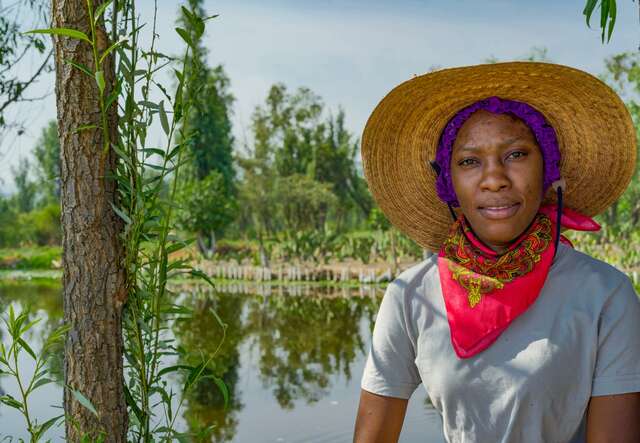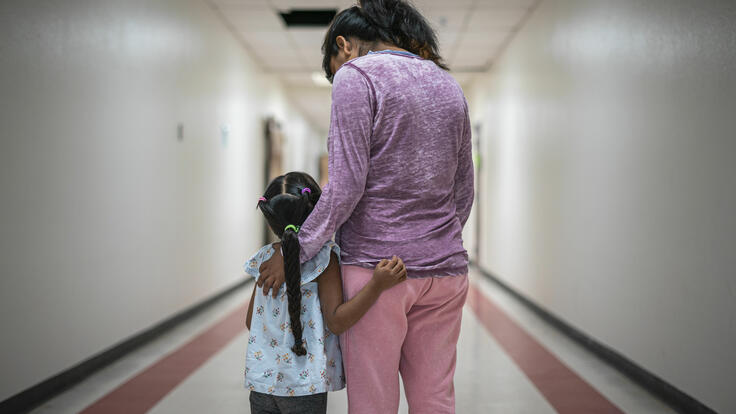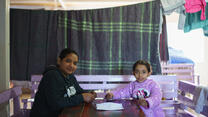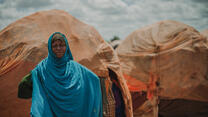Country facts
- Population: 132 million
- Rank in Human Development Index: 86 of 191
IRC response
- Started working in Mexico: 2019
Mexico continues to face a multidimensional humanitarian crisis. As violence across Mexico and Northern Central America increases, families are seeking safety in the United States. However, restrictive U.S. migration policies have left many stranded in Mexico, putting the safety of hundreds of families at risk. They join an increasing number of internally displaced people who have fled violence in Mexico.
Climate change exacerbates food insecurity, water scarcity and internal displacement in Mexico, while increasing the severe risk of natural disasters in the country.
The International Rescue Committee (IRC) is working alongside local organizations to provide emergency and integration support to families at Mexico’s northern and southern borders and in other key cities across the country, but additional funding is urgently needed.
Mexico has long been affected by violence linked to organized crime, including international cartels. In roughly 80% of the country, at least one armed group is active. Nearly 400,000 people have been officially reported as internally displaced, although experts believe the true number is much higher. Similar patterns of violence, comparable to conflict zones, can be seen in neighboring countries, where hundreds of thousands of people are displaced each year. People from all over the world have fled to Mexico, hoping to reach safety in the United States.
Recent shifts in U.S. migration policy, including increased deportations and the cancellation of CBP One, have left an alarming number of people stranded in Mexican cities, where access to basic services is severely limited.
Essential services, such as health care and education, are scarce in border cities, leaving service providers overwhelmed. Shelters often operate far beyond their intended capacity, supporting individuals for over a month despite being originally designed to house them for just three days. These lack of services places women and children—who are already in vulnerable situations—at particular risk.
Reports indicate that children face threats of sexual abuse, kidnapping and gang recruitment, while women are especially vulnerable to criminal groups involved in human trafficking and exploitation. An IRC survey found that one in four respondents reported having been kidnapped and experienced severe violence and abuse.
The IRC’s mission is to help people whose lives and livelihoods are shattered by conflict and disaster to survive, recover and gain control of their future.
The IRC is supporting local partners in Mexico to strengthen their capacity and assist people on the move. We deliver programs that support women and girls who have experienced violence and expand access to essential services such as medical care and psychosocial support. The IRC also analyzes the root causes of displacement, including by collaborating with local and national organizations addressing climate change.
Between 2019 and 2024, IRC Mexico provided critical services to nearly 150,000 people. Over one million people have accessed critical information on the InfoDigna Platform.
In 2025, significant reductions in funding for migration and humanitarian response projects deeply affected local organizations working on the front lines to support people in transit throughout Mexico. To help address this gap, the IRC launched the Emergency Shelter and Community Kitchen Fund (FECAMEX), providing direct financial support to these vital spaces. Their work is indispensable in this crisis, and our funding helps ensure they can continue to offer dignity, safety and hope to those in need.

As violence continues to plague Mexico and border towns specifically, the IRC’s work is more critical than ever. We put the needs of those most affected by the crisis at the forefront of our efforts and create tangible improvements to the people we serve.
The IRC continues to assess our impact and plans to scale up our response at the border, but additional funding is urgently needed. International donors must provide emergency funding to support a response that meets the scale of this crisis. Those who are forcibly displaced and looking to stay in Mexico will require integration support, including legal residency and a sustainable source of income. As Mexico faces significant impacts from climate change, further efforts are required to help communities adapt and recover from natural disasters.





